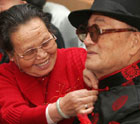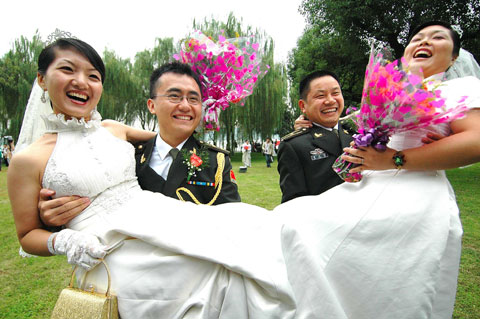
As it emerges from the 17th National Congress, the Communist Party faces three fundamental challenges in managing the world's biggest political economy: measuring the performance of officials, measuring public choice, and reflecting demographics in party membership.
Measuring officials' performance
In China's centralized political system, until very recently, the tendency has been to evaluate the performance of senior officials for higher office on the basis of a few numerical targets, the foremost being economic growth. That has been identified as prompting officials sometimes to take actions with unfavorable social consequences.
It is no simple task to develop a more comprehensive measure of the performance of public officials that effectively incorporates the myriad of changing social, political, economic, and environmental objectives. To become the world's first centrally managed political system to successfully achieve such performance measurement, I believe it would be helpful for China to convene the world's greatest minds in management and social science to develop such a measure along the lines of "social indicators" like the Gini and Engel indices.
The Central Party School can be a resource for this purpose with potential to become one of the world's great schools of public administration. As at other Chinese universities, some foreign social science professors are invited to teach for specific periods and an exchange program with Harvard University brings 60 Party School students to the Kennedy School of Government for two months.
It would be a good idea to expand such arrangements to provide the know-how for "scientific development" of a leading world political economy. In this regard the school could lead Chinese universities that, while subject to performance-based reform efforts by China's education ministry, need to assure resources and a collegial environment conducive to foreign academic exchange.
Appropriate performance measurement provides the right behavioral incentives for officials so that discipline inspection and the moral suasion of management-by-campaign is invoked only occasionally rather than frequently to remedy bad behavior prompted by misaligned incentives.
Anti-corruption measures should also avoid discouraging good behavior. For example, the one to promote civil servants on the basis of voting by colleagues including subordinates can discourage over-performers and demanding bosses, if not evaluated properly.
Measuring public choice
After nomination for (ultimately for promotion to) political office or delegate selection, voters in China effectively see a candidate's resume, while outright campaigning for votes is considered interference with a voter's independent decision-making. Consequently the local village or urban neighborhood level is the only level where grass-roots voters can really know the candidates aside from their resume and it is very important to note this primary, logistical reason why. Consequently higher-level office, or delegate selection, is by nomination to the respective level's elections committee for ratification by that level's full Party committee which can be sufficiently acquainted with the candidate.
Direct citizen input is welcomed in the form of submitting comments about nominees. Furthermore expert and citizen opinion has increasingly been solicited and considered by legislators and policymakers in public and expert comment proceedings and in leading-groups for important laws and policies. This supplements real-time the hierarchical committee selection process for officials where popular concerns percolate up the career promotion ladder. It also facilitates getting compliance on reform at provincial and local levels by getting input there.
Since public preference is an ever-changing moving target, the task of developing a performance indicator for public officials is alleviated by public evaluation of officials or laws by direct voting or polling, where the public instantly reveals its preference. But testing the wind for the latest flavor-of-the-month often hampers good policy-making in technically challenging expert areas where the public is easily hijacked, and private interests may seek political office for economic advantage. However, a "revolving-door" in and out of political office does enable a healthy exchange of skills with the private sector.
Multiple-candidacy for final delegate or committee selection has already emerged in China in the form of "over-booking" of a small percentage more of candidates than there are seats to fill. And the central government has begun appointing accomplished outside professionals to head demanding ministries and agencies, such as science and technology, public health, and civil aviation.
The Party is intent that "China's democracy will not be manipulated by capital", a concern that mirrors the "money politics" watchword in mature democracies where the huge cost of financing campaigning is the Achilles heel of direct voting, and where campaign finance and disclosure laws and supervision have not quite got it all right yet to eliminate creative abuse.
With its super-charged economy awash with cash at the very time China is bringing its legal system up to speed and international standard, China could not accomplish such a feat in short order.
Meanwhile, through the Chinese People's Political Consultative Conference the other eight parties are increasingly observing, advising and participating in decision-making, which includes selection of those parties' delegates to the people's congresses which meet annually, and the recent appointment of accomplished non-Party members to head some ministries.
Demographics in Party membership
Meanwhile, the Party faces the need to accommodate in its membership and delegates two important demographic changes in the population: the emergence of the "new social stratum" of urban young professionals and businessmen whose size may soon equal the entire Party membership of 73 million, and the younger adult population (under 45 years old, which is 60 percent of China's adult population).
To meet the economy's voracious appetite for skills, the young have been putting effort into attending law schools or pursuing MBAs and CFAs at schools like Beijing's Mundell International University of Entrepreneurship, named for the defender of a stable RMB whom I helped first visit China over a decade ago.
In adjusting membership requirements, including the membership course and exam, to compete for the time of the best candidates, the Party would also have to consider the concern of existing members not to dilute standards by too rapid expansion in membership.
Older members deserve every recognition for laying the foundation for China's social and economic miracle.
The Party's application of "socialist" values to cope with the new reality, or "Chinese characteristics", is a tribute to them in the relentless drive for "reform and opening up" and serves as a secular value system for promoting a civil "harmonious" society.
The author is an investment banker and economist operating from Beijing who is a regular contributor to China Daily
(China Daily 10/23/2007 page10)












